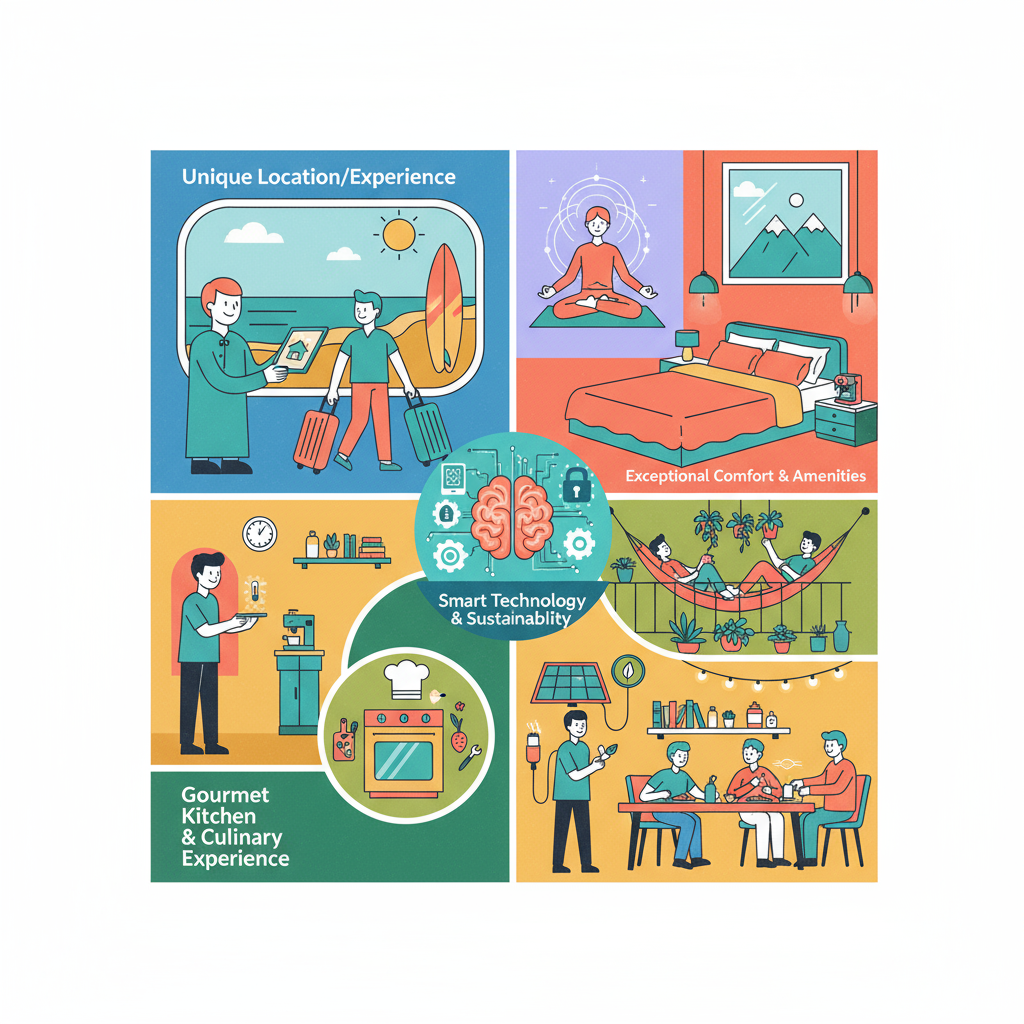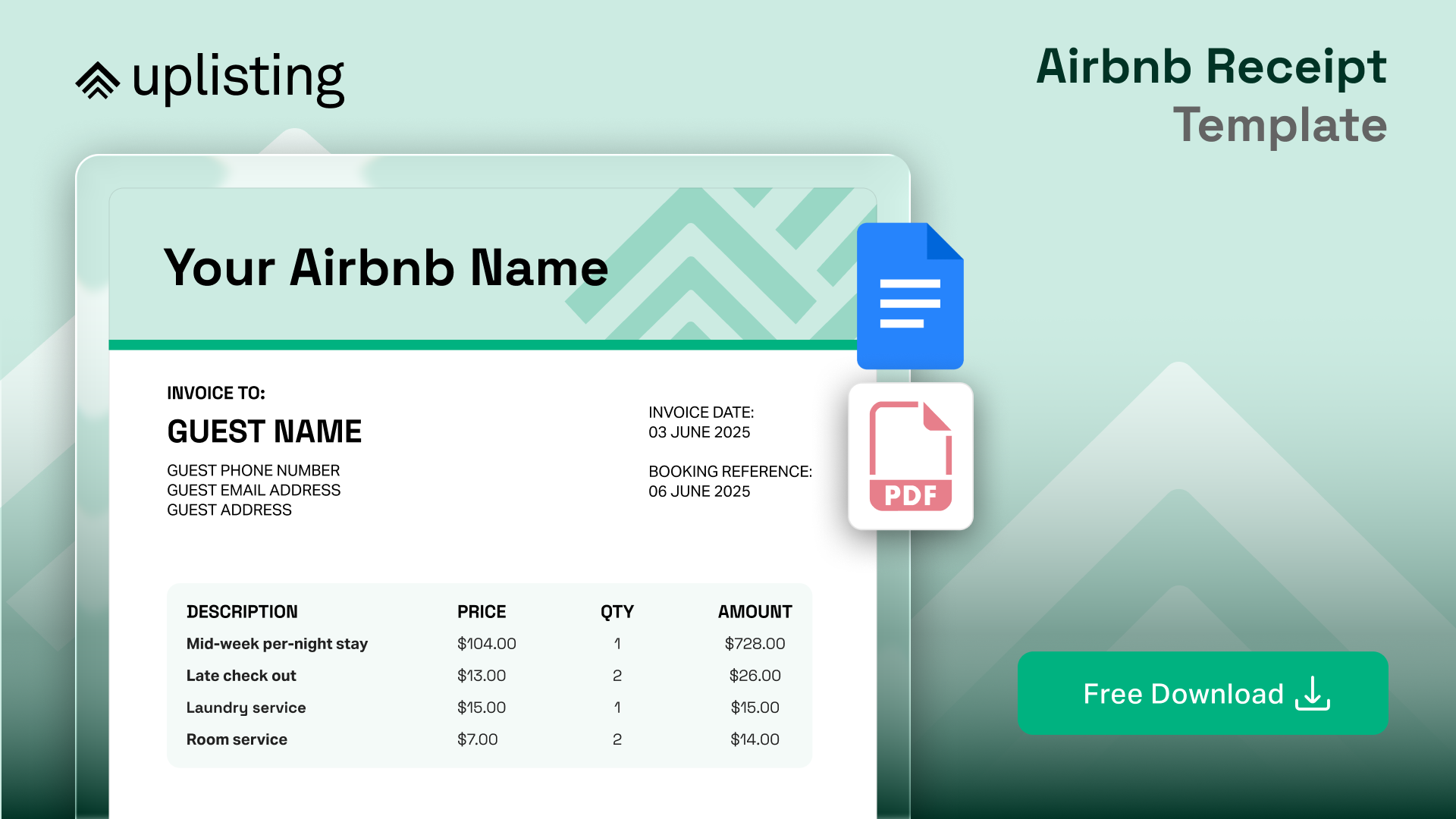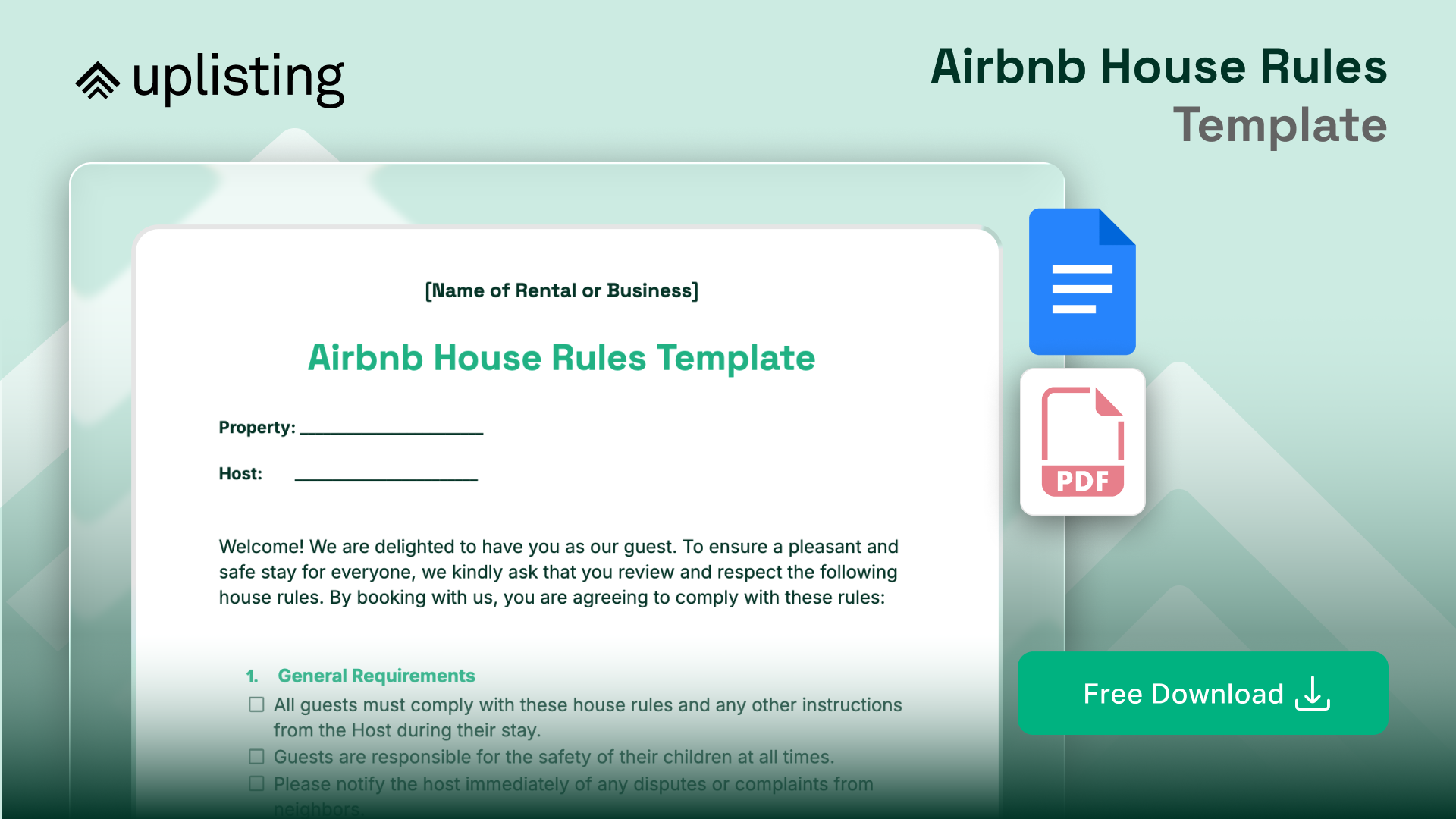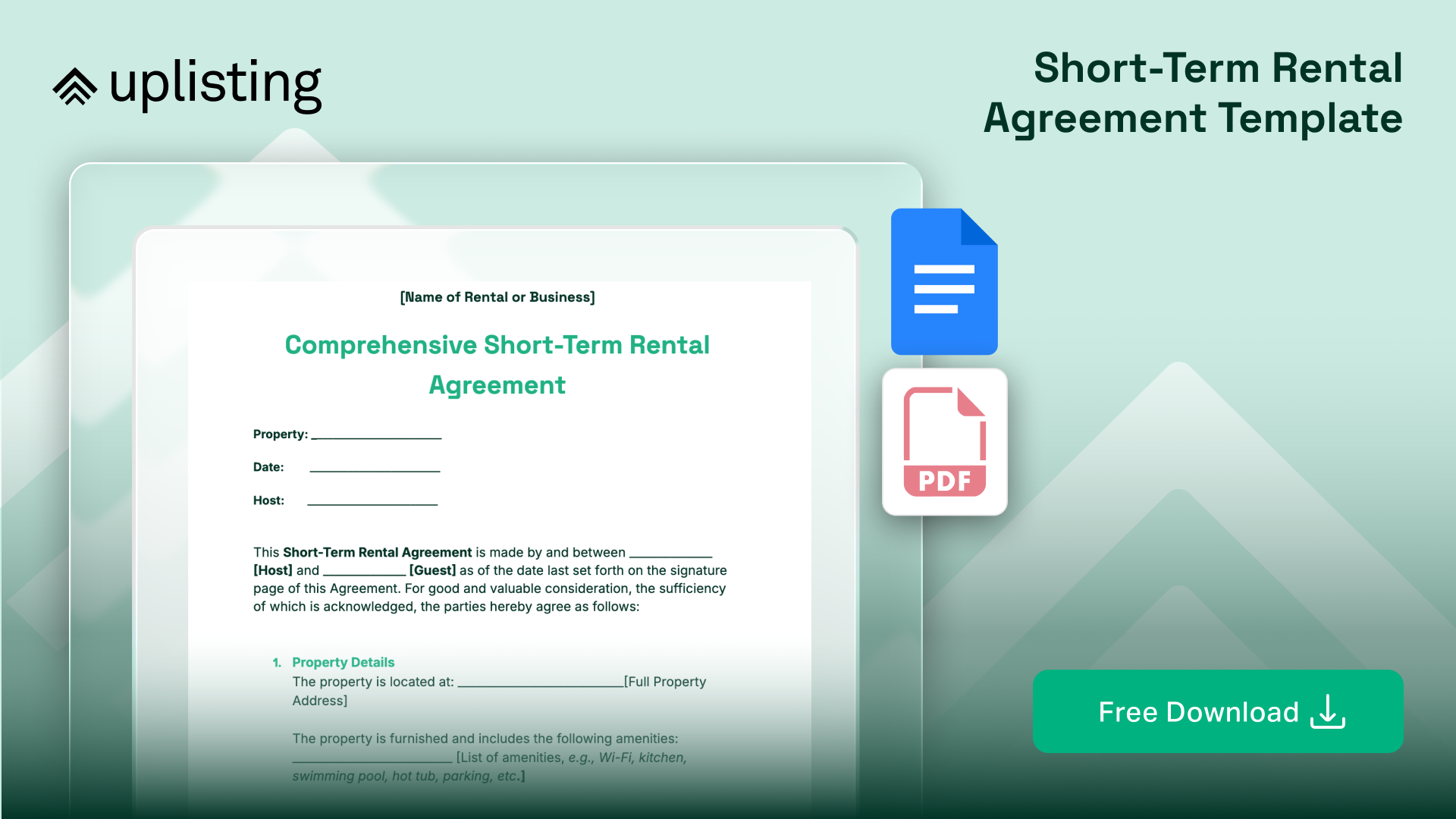Key Takeaways
Airbnb host insurance helps protect against financial risks that arise from property damage or guest injuries.
Standard homeowners insurance often excludes short-term rental activity and leaves key gaps in coverage.
Understanding your exposure allows you to supplement AirCover with vacation rental insurance that actually meets your needs.
Managing short-term rentals is like navigating an iceberg. What's visible above water is just a simple combination of bookings and turnover days. Beneath the surface, however, lurks the massive, hidden bulk of risk: property damage from careless guests, liability claims that appear out of nowhere, and income losses that can freeze your cash flow. Without proper protections in place, these submerged dangers can tear through your business just as surely as an iceberg through a ship's hull.
As a starter operator, you’re likely relying on your personal homeowners policy or assuming Airbnb’s AirCover has your back. Most traditional insurance products don’t account for the unique risks of hosting paying guests, though, and AirCover has limitations that could leave you exposed.
Securing the right Airbnb host insurance is about protecting your time, investments, and future revenue. Without coverage designed for short-term rental operations, a single claim could cost far more than the premium you saved.
What AirCover Provides
AirCover includes two main protections: Host Liability Insurance and Host Damage Protection. Both address risks that come with short-term rentals, but they don't replace standalone Airbnb host insurance. Knowing exactly what’s covered helps you avoid surprises when something goes wrong.
Host liability coverage: What $1 million actually gets you
Host Liability Insurance covers up to $1 million if a guest gets injured during their stay or if their belongings are damaged while on your property. Coverage also applies in shared areas like driveways, hallways, or building entrances—places where responsibilities often overlap.
Liability protection doesn’t stop with the host. Co-hosts and cleaners also fall under the same policy. If a cleaner accidentally injures someone or a co-host gets named in a legal claim, they’re protected too. The policy doesn’t cover everything, though. Intentional harm, mold, and anything related to infectious diseases are excluded.
Host damage protection: Not quite insurance
Host Damage Protection offers up to $3 million for property damage caused by guests or their visitors. That includes stolen items, broken furniture, vehicle damage on-site, and even income lost from canceled bookings when repairs make the space unusable.
Despite the coverage amount, this isn't a formal insurance policy. It works more like a reimbursement program with its own rules and deadlines. Damage from everyday use, weather, or cleaning mistakes won’t qualify. If a guest knocks over a lamp, that’s likely covered. If your sofa looks worn after months of use, you’re on your own.
Claims go through third-party processors, not your own provider. That means less control over the process, stricter proof requirements, and slower payouts. For straightforward issues, the system handles it well. When repairs are expensive or the situation’s messy, relying only on AirCover can leave gaps.
AirCover adds a layer of protection, but hosts still need coverage that matches how they operate.
Create 5-star guest experiences
Give your guests unforgettable experiences
With Uplisting, you can send the right messages at the right time on all booking sites. Read and respond to guest messages in a single, unified inbox — whether you’re at the office or on the go.
Common Gaps In Coverage
AirCover sounds like a safety net with its multi-million dollar protections, but it only covers a narrow slice of what can actually go wrong when hosting guests. Property managers often assume they’re fully protected—until a claim gets denied for a reason buried in the fine print.
One of the biggest sources of confusion is intentional guest damage. If someone smashes a lamp out of frustration or punches a hole in the drywall, coverage may not apply. When the damage appears deliberate or goes unreported by the guest, claims often stall or get rejected entirely.
Wear and tear is another area where expectations don’t match reality. Scuffed walls, faded upholstery, sagging mattresses—AirCover doesn’t pay for any of it. These are all considered normal use, even if replacing furniture or repainting walls drains your maintenance budget. The same goes for accidents during routine cleaning. If a cleaner spills bleach on a rug or scratches a wood floor with a vacuum, you’re likely covering the repair.
Weather-related damage also falls outside the program. Hurricanes, wildfires, floods, and earthquakes are all excluded. If a storm knocks out power and forces a last-minute cancellation, lost income typically isn’t reimbursed. Hosts in high-risk areas often miss this detail until they’re facing thousands in repairs and empty calendars.
Liability coverage has limits too. Legal claims tied to mold, allergens, or long-term exposure rarely qualify. If a guest has a severe reaction to pet dander or claims mental distress from environmental conditions, the protection doesn’t extend that far. Lawsuits involving co-hosts, cleaners, or service providers can also fall into legal gaps that aren't covered by the platform.
Standalone Airbnb host insurance gives property managers more control. Policies built for short-term rentals cover everything from structural damage to legal fees, so hosts aren’t caught off guard when something goes sideways. For operators who rely on consistent revenue and fast recovery after setbacks, having their own coverage is less of a luxury and more of a basic requirement.
Practical Steps to Reduce Risk
Running a short-term rental means juggling logistics, guests, and repairs—often all in a single day. Insurance helps cover setbacks, but smart operators don’t wait for problems to show up. Small changes to daily routines and communication can help avoid expensive claims and missed income altogether.
House rules act as your first line of defense. They're not just for show; they give you something concrete to point to when a guest breaks boundaries. Skip vague phrases like "please be respectful" or "keep noise to a reasonable level." Instead, say, "no smoking indoors," "quiet hours from 10 p.m. to 7 a.m.," or "limit of four guests on property." Clear language gives you control and makes enforcement easier when things go sideways.
Screening guests doesn't need to be complicated. Most platforms already include profile reviews and identity checks. Add a layer by requiring a minimum stay or limiting last-minute bookings. Using specialized tools like Uplisting's guest verification feature adds another security checkpoint by validating guest identities before arrival. These filters help you avoid risky guests who might throw parties or overlook your rules.
Automated messaging keeps everything consistent. Use it to send house rules, check-in instructions, and reminders about check-out. Each message builds a paper trail. If a guest challenges a charge or leaves a negative review, you already have the timeline and receipts.
Prevent damage with detailed property guides
Acomprehensive house manual serves as your first line of defense against property damage and liability claims. When guests understand exactly how to operate that tricky gas fireplace or complex entertainment system, they're less likely to break things out of frustration or misuse. Includedetailed appliance instructions with photos, specific parking boundaries to avoid landscaping damage, and emergency contacts that can address issues before they escalate. These preventative measures directly reduce your insurance risk exposure.
Check-in and check-out should run like clockwork. Send clear steps before arrival and departure, and include photos if needed. Visuals help avoid confusion, especially for outdoor locks, gated access, or hidden entrances. A smooth arrival sets the tone. A structured exit discourages messes and overstays.
Perform regular property checks
Small damage builds up fast. Scuffed floors, leaky faucets, and loose furniture often go unnoticed until a guest complains or something breaks during a stay. Addressing repairs early keeps your rental in good shape and avoids friction.
Set up a schedule to check high-use areas every few weeks or after a set number of stays. Rotate through bedrooms, bathrooms, and shared areas. Use a maintenance log to track what you find and what’s fixed. Photos and notes add credibility if you ever need to file a claim under Airbnb host insurance or another policy.
Maintenance records matter. They show that you’re staying on top of repairs and taking guest safety seriously—and that carries weight with insurers, too.

You’re in great company
Sign up
Some of the largest short-term rental operators (with 250+ properties) rely on Uplisting's software to scale their businesses.
How to File A Claim
Filing a claim under Airbnb host insurance isn’t complicated, but skipping details or missing deadlines can throw the process off quickly. You’re often working with third-party insurers like Zurich in addition to Airbnb support agents, and they expect accuracy and proof.
Start by pulling together everything they’ll ask for. To submit a property damage claim, you need:
Photos of damage: Take clear, timestamped images before cleaning or replacing anything.
Guest messages: Include any communication where the guest admits fault or mentions the issue. Screenshots from the platform help here.
Receipts or cost estimates: Share invoices, product links, or detailed quotes showing what the item was and how much it will cost to replace or repair.
Booking reference: Note the reservation ID and stay dates for the guest who caused the damage.
Time matters. You have 14 days after checkout to report property damage. If you wait, the claim can be denied automatically, even with perfect documentation. For liability issues—like injuries or damage to guest belongings—report right away. These claims often need more formal records, including incident reports or contact details for anyone involved.
Once you file, insurers like Zurich take over. They’ll handle guest injury claims, property loss tied to shared spaces, and any legal issues that come up. Communication shifts from the platform to the insurer. Be ready to send more details if they ask, and don’t let requests sit in your inbox. Delays on your end can stall the payout.
For claims involving legal responsibility, stick to the facts. Avoid guessing what happened or adding emotional commentary. Insurers rely on clean, objective reports—not opinions. Every document, message, or photo becomes part of the file. Treat it like you’re building a timeline, not telling a story.
Insurance can cover the mess, but only if you treat claims like the formal process they are. Each step helps you protect your property, your income, and the time you've spent building your short-term rental business.
When Extra Insurance Becomes Essential
Homeowners policies don’t play well with short-term rentals. They’re built for people living in their homes full time, not for properties booked by strangers on a weekly basis. Most personal insurance plans exclude anything tied to guests paying to stay, which means filing a claim after a guest breaks something could lead to a denied payout or even a canceled policy.
Short-term rental insurance fills that gap. It’s built for properties that generate income from frequent guest stays. Instead of guessing whether a claim falls into a gray area, the coverage actually expects those risks—like accidental damage, lost revenue from repairs, or a liability claim after someone slips on the porch.
Comparing policy types
Homeowners insurance: Protects the structure and belongings but often cuts off coverage the moment a paying guest walks through the door. It assumes the owner lives there and doesn’t run a business.
Landlord insurance: Offers better protection for long-term tenants but still misses the mark for short-stay turnover, higher traffic, and guest-related issues.
Short-term rental insurance: Covers property, liability, and income tied to short guest stays. It works with how hosting actually happens, including high-volume bookings, co-hosts, and remote operations.
Specialized providers like Proper Insurance focus on this kind of coverage. Their policies come from major carriers and are written for short-term rental operators. They include structural coverage, contents, guest-related damage, income interruption, and legal defense. Unlike a standard policy that might penalize you for hosting, these plans expect it.
Weighing cost against protection
Premiums for Airbnb host insurance usually run higher than a personal homeowners plan, but the cost reflects the real risks. A flooded bathroom that knocks your property offline for a week doesn’t just mean a few towels to replace—it means canceled stays, lost income, and potential reviews that hurt future bookings.
Canceled revenue: If a guest accidentally causes enough damage to block future reservations, the policy can cover lost income while repairs are underway.
Legal issues: If someone gets injured during a stay, liability protection can cover court fees, settlements, and medical bills.
Property damage: Fire, busted pipes, or guest vandalism—covered, even if no one admits fault.
For operators with a few listings, every week off the calendar matters. Planning around repairs, guest claims, or denied coverage wastes time and money. Airbnb host insurance tailored for short-term rentals gives hosts back control—and peace of mind when the unexpected shows up.
All-in-one Vacation Rental Software and Channel Management System
Get started in seconds by connecting Airbnb
Manage short-term rentals & bookings, message guests, take payment, and so much more. All in one easy-to-use platform (that never double-books).
Leveraging Smart Management Tools
Insurance steps in when problems get expensive. Smart tools help make sure problems don’t happen in the first place. Fewer incidents mean fewer claims, fewer headaches, and more time focused on bookings instead of repairs or disputes. Running short-term rentals with tight, consistent systems lowers risk and keeps operations running smoothly.
Most claims tied to Airbnb host insurance start with a missed detail. A guest can’t figure out the lockbox. A cleaner overlooks a leak. A co-host doesn’t see a booking update. These aren’t dramatic failures—just gaps in communication that snowball when no one has the full picture.
Automate where it counts
Automation supports consistency. Scheduled messages for check-in, check-out, and house rules help guests feel informed before they even arrive. Clear instructions for operating appliances or respecting quiet hours reduce confusion and prevent damage caused by guesswork.
Behind the scenes, automated task lists and calendar-based triggers keep teams aligned. Cleaning gets scheduled the moment a guest checks out. Maintenance reminders fire after a set number of stays. Turnovers happen on time, and the property stays guest-ready without last-minute chaos.
Centralize conversations
Switching between message threads across platforms invites mistakes. A unified inbox pulls everything together so nothing gets missed. Fast, accurate replies build trust and reduce friction from the start.
When all guest communication lives in one place, patterns become easier to catch. Repeated requests for early check-in? Pushback on house rules? Those are signals to either reinforce expectations or reconsider the booking. Visibility makes it easier to stay in control.
Run operations that prevent claims
Every automated task, message template, and calendar sync shrinks the space where issues can slip through. Consistent operations save time and keep your listings safer.
Fewer missed details: Cleaning schedules and maintenance tasks run on autopilot, so small problems don’t grow into expensive ones.
Stronger documentation: Time-stamped messages, task logs, and property notes create a clear record if you ever need to support a claim.
Better guest stays: When guests know exactly what to expect—and how to treat the space—they’re less likely to push boundaries or cause damage.
Smooth, repeatable processes turn short-term rental management into something sustainable. When everything runs predictably, you won’t need to lean on Airbnb host insurance nearly as often.
Understanding the limits of AirCover and the broader risks of hosting is essential for any short-term rental operator aiming to protect their assets and income. While Airbnb’s built-in protections offer a helpful starting point, they leave important gaps, especially when it comes to income loss, liability, and property damage caused by guests. Supplementing platform coverage with dedicated short-term rental insurance ensures your business is prepared for the unexpected.
At the same time, preventing issues before they happen is just as critical. Streamlined operations, consistent communication, and reliable automation reduce the likelihood of claims and keep your business running smoothly. With the right insurance and the right tools in place, you can confidently grow your portfolio while minimizing risk.
Sign up for Uplisting to streamline your vacation rental management.
FAQs About Airbnb Host Insurance
Does Airbnb provide insurance to hosts?
Airbnb includes Host Liability Insurance and Host Damage Protection through its AirCover program. Both apply automatically to every booking. The liability portion is a real insurance policy that helps if a guest gets hurt or damages someone else's property. In contrast, the damage protection works more like a reimbursement system. It covers guest-related property damage but skips over issues like wear and tear, storm damage, or anything caused by cleaners. You’re also expected to submit specific documentation within a strict timeline to qualify.
What insurance do you need as an Airbnb host?
You need short-term rental insurance that covers property damage, guest injuries, and lost income when repairs force cancellations. Most homeowners policies won’t help during guest stays because they don’t include business-related activity. Even landlord policies fall short if guests stay for fewer than 30 days. Short-term rental insurance is built for high guest turnover and protects your property, your income, and anyone working with you—like co-hosts or cleaners.
Do I need extra insurance to run an Airbnb?
Yes, especially if you depend on rental income. AirCover offers some protection, but it leaves gaps you’ll notice fast when something serious happens. Without extra coverage, you could end up paying out of pocket for repairs, legal fees, or canceled bookings. Short-term rental insurance steps in where platform protection stops—helping you recover faster and keep operations moving.
How do I protect myself as an Airbnb owner?
Start by putting the right insurance in place. Then, keep your rental running smoothly with clear house rules, regularly scheduled maintenance, and consistent guest messaging. Use smart locks to manage access, review guest profiles before accepting bookings, and take time-stamped photos between stays. Keep a log of repairs and cleanings. When everything runs on a system, you can catch issues early and avoid unexpected costs.


















.png)

